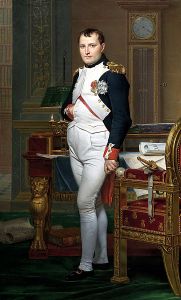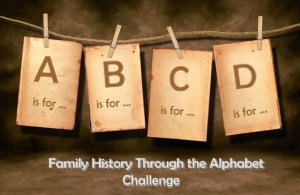 Continuing with the Family History through the Alphabet Challenge… N is for Napoleon! Napoleon may have been a dictator, but he did a few other things as well – one thing in particular that may even have an impact on your family history research today. In 1804 he instituted the Civil Code, which is now known as the Napoleonic Code. It was adopted throughout many of the lands he conquered, and it remained in effect after his death. The Civil Code granted many things we take for granted today such as freedom of religion and equality. Of course, it stated other things that we wouldn’t necessarily be happy with today like patriarchal power – in other words, husbands rule the household. But genealogically speaking, we have Napoleon and his code to thank for civil registration of vital events such as births, marriages, and deaths. The Roman Catholic church had been keeping records prior to this – in some places for centuries – but the Civil Code made the record-keeping a state function.
Continuing with the Family History through the Alphabet Challenge… N is for Napoleon! Napoleon may have been a dictator, but he did a few other things as well – one thing in particular that may even have an impact on your family history research today. In 1804 he instituted the Civil Code, which is now known as the Napoleonic Code. It was adopted throughout many of the lands he conquered, and it remained in effect after his death. The Civil Code granted many things we take for granted today such as freedom of religion and equality. Of course, it stated other things that we wouldn’t necessarily be happy with today like patriarchal power – in other words, husbands rule the household. But genealogically speaking, we have Napoleon and his code to thank for civil registration of vital events such as births, marriages, and deaths. The Roman Catholic church had been keeping records prior to this – in some places for centuries – but the Civil Code made the record-keeping a state function.
The Code spelled out exactly what must be recorded in the vital records, and the information required was more than what was customarily kept in church record books. For example, a religious baptismal record would likely indicate the child’s name, date of birth, date of baptism, parents’ names, godparents’ names, and the location. Napoleonic birth records required the exact time of birth as well as the full names, ages, residences, and professions of the parents and witnesses. Napoleonic marriage records are rather detailed and include the ages, residences, and professions of the bride and groom, their parents, and the witnesses. I don’t think the Napoleonic death records are as detailed as those for birth and marriage because it lacks the cause of death and the birthplace of the deceased. But, the Civil Code required that these events be registered within the community whereas prior to this it was merely a religious function.
The Civil Code was adopted in countries occupied by the French during the Napoleonic Wars and became the basis of law in Italy, the Netherlands, Belgium, Spain, Portugal, Poland, Romania, and parts of Germany. I gave an example of a Napoleonic birth record in the Baptism of Jozef Piontkowski. Learn more about translating Polish vital records in the Napoleonic format at this link.
[Written for the weekly Family History through the Alphabet Challenge]


Great selection for the letter N! Napoleon’s influence on Poland and the area called Galicia explains why there are so many vital records from the 1800a for today’s Ukraine. I have ordered several for my Ukrainian Jewish ancestors from Warsaw archives. Unfortunately for my research the Russian Empire portions of Ukraine were not so diligent – so, I struggle for records from those areas that had not been under Napoleon’s rule.
I try to remember to lift a glass of (French) wine to Napoleon each time I successfully locate Eastern European records.
Thanks for the suggestion, Emily! The next bottle of Cotes du Rhone is for Napoleon!
Pingback: Family History Through the Alphabet - N is for ... | Genealogy & History News
Hooray for Napoleon and civil registration records!